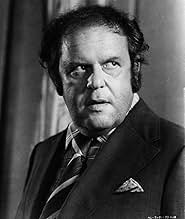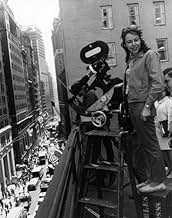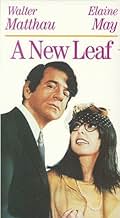IMDb-BEWERTUNG
7,3/10
8257
IHRE BEWERTUNG
Playboy Henry führt ein Leben in Saus und Braus. Als er vor finanziellen Problemen steht, schmiedet er einen teuflischen Plan: Er will die reiche Henrietta heiraten und später ermorden. Doch... Alles lesenPlayboy Henry führt ein Leben in Saus und Braus. Als er vor finanziellen Problemen steht, schmiedet er einen teuflischen Plan: Er will die reiche Henrietta heiraten und später ermorden. Doch dann verliebt er sich in sie.Playboy Henry führt ein Leben in Saus und Braus. Als er vor finanziellen Problemen steht, schmiedet er einen teuflischen Plan: Er will die reiche Henrietta heiraten und später ermorden. Doch dann verliebt er sich in sie.
- Auszeichnungen
- 1 Gewinn & 3 Nominierungen insgesamt
Conrad Bain
- Professor Heinrich
- (Nicht genannt)
Ida Berlin
- Maid
- (Nicht genannt)
Mildred Clinton
- Mrs. Heinrich
- (Nicht genannt)
Trent Gough
- Victor the Butler
- (Nicht genannt)
Empfohlene Bewertungen
Il not recount the story, as others have. The lack of response and proper public recognition for this film my be due to Elaine May's very dry wit and wry sense of humor, which, I think, simply sailed over the heads of many viewers. And it's truly most unfortunate, as this is a VERY funny film (for those who are perceptive and appreciate the subtler and darker shades of humor and life)! To the dude who rated it a "1": "A New Leaf" was nominated for 2 Golden Globes (Comedy -- Best Picture and Best Actress) and for the WGA's (the industry's official Writer's Guild -- i.e., her peers, other screenwriters) writing award for best comedy (from another medium) that year! No offense, but I value my own (and their) sensibilities a bit more than yours!! And it's impeccably acted, as others have mentioned, filled with flawless comedic timing and wry, wry wit. Simply wonderful.
Few people have ever even heard of "A New Leaf" and that is a shame. It is one of the funniest films in the last 30 years. Walter Matthau plays a spoiled rich man who discovers that his fortune is gone and he needs to marry in a short time to save what little he has left. His solution? Woo a rich woman, marry her, and kill her all in a week. So he picks the nerdy, klutzy, and not so attractive Elaine May (brilliant...she also wrote and directed) whose love is flowers. The film then follows Matthau as he attempts to carry out his plan. This film is full of BIG laughs and should be seen by anyone who loves a good comedy.
Elaine May has created a many layered comedy that stays with you, if you can connect with it. The paths ones life takes often has many bends. Henry (Matthau) has no idea how many. Born to a life style he can not maintain, he chooses to deal with adversity by ignoring it. Eventually reality shakes him loose, and he must learn to deal with things and give back to society rather than taking from it. Henrietta (May) is his victim and his savior. The epitome of a child who was always sent away, she has grown into a person who is not really there. Her catalyst and transmogrifier is Henry. Haunting dialog and poignant social exposition make this classic 70's sleeper worth every stretch.
A New Leaf (1971)
A kookie, forcibly odd movie. If at first you think it's just plain stupid, keep watching. It's really well balanced, smartly written, and acted with more restraint than usual for a madcap movie like this.
It's billed (by some) as filled with dark humor, but it didn't strike me as dark, not like the contemporary "Harold and Maude" for example. But there is an unusual tone achieved here that is just slightly different and worth getting a feel for. There is, for another example, a parallel in general plot and scenario to "How to Murder Your Wife" from 1965, complete with the willing butler and the hapless rich bachelor, but that movie is a silly 1960s farce and this one has an edge of almost poignancy to it. (I write that word and think Elaine May would cringe--only because I don't think there is an intention to be sentimental or even romantic, the last scene notwithstanding.)
The star is singularly Walter Matthau, who is almost necessarily goofy just by appearances. But maybe the first clever trick by the director, Elaine May, is putting the goofy man in even goofier situations so that he comes off as actually someone serious and believable. To have his character, Henry Graham, driving in his red Ferrari wearing a crash helmet is pure insanity, yet you don't blink an eye. The guy is self-absorbed and nuts. But also very likable, a little out of touch the way we all are, or wish we could be (if we had his money).
And of course the man's dilemma is stated immediately: the money he once had so much of is used up. And you have to see to appreciate the one long scene in the first twenty minutes with Graham meeting his financial adviser about some bounced checks. This is comedy at its absolute best--I mean that. Watch only this scene if you must (and I dare you to skip the rest of the movie once you do). The actor opposite Matthau here is William Redfield, who pulls off the most brilliant of performances.
The other leading character, eventually, is Elaine May herself as the clumsy, naive, filthy rich scientist who Graham sets his sights on for salvation. She is terrific, as well, and like Woody Allen of the same time ("Bananas" is also 1971) seems to direct her own comic zaniness with a calculated distance. The rest of the shenanigans play out with the necessary twists, and it's consistently funny.
So, see this for its freshness even four decades later. No wonder it has a (small but growing) cult following. May has suffered historically from having made the bizarrely awkward "Ishtar" and for being forever linked in the early 1960s as the comedy partner of Mike Nichols, whose movie career overshadows almost everyone's. But here, at least, she shines on her own terms, without distraction.
A kookie, forcibly odd movie. If at first you think it's just plain stupid, keep watching. It's really well balanced, smartly written, and acted with more restraint than usual for a madcap movie like this.
It's billed (by some) as filled with dark humor, but it didn't strike me as dark, not like the contemporary "Harold and Maude" for example. But there is an unusual tone achieved here that is just slightly different and worth getting a feel for. There is, for another example, a parallel in general plot and scenario to "How to Murder Your Wife" from 1965, complete with the willing butler and the hapless rich bachelor, but that movie is a silly 1960s farce and this one has an edge of almost poignancy to it. (I write that word and think Elaine May would cringe--only because I don't think there is an intention to be sentimental or even romantic, the last scene notwithstanding.)
The star is singularly Walter Matthau, who is almost necessarily goofy just by appearances. But maybe the first clever trick by the director, Elaine May, is putting the goofy man in even goofier situations so that he comes off as actually someone serious and believable. To have his character, Henry Graham, driving in his red Ferrari wearing a crash helmet is pure insanity, yet you don't blink an eye. The guy is self-absorbed and nuts. But also very likable, a little out of touch the way we all are, or wish we could be (if we had his money).
And of course the man's dilemma is stated immediately: the money he once had so much of is used up. And you have to see to appreciate the one long scene in the first twenty minutes with Graham meeting his financial adviser about some bounced checks. This is comedy at its absolute best--I mean that. Watch only this scene if you must (and I dare you to skip the rest of the movie once you do). The actor opposite Matthau here is William Redfield, who pulls off the most brilliant of performances.
The other leading character, eventually, is Elaine May herself as the clumsy, naive, filthy rich scientist who Graham sets his sights on for salvation. She is terrific, as well, and like Woody Allen of the same time ("Bananas" is also 1971) seems to direct her own comic zaniness with a calculated distance. The rest of the shenanigans play out with the necessary twists, and it's consistently funny.
So, see this for its freshness even four decades later. No wonder it has a (small but growing) cult following. May has suffered historically from having made the bizarrely awkward "Ishtar" and for being forever linked in the early 1960s as the comedy partner of Mike Nichols, whose movie career overshadows almost everyone's. But here, at least, she shines on her own terms, without distraction.
10wisaacs
This film stands up as one of the most sophisticated and heartfelt comedies ever put to celluloid. Watch it alongside "Hobson's Choice", "Hail The Conquering Hero", "The Apartment", "Shop Around The Corner", "Father Goose", "Trouble In Paradise", and "Love Streams". Although not a romance, "The Ladykillers" is a black comedy with a similar tone. See if "A New Leaf" doesn't hold up to these consensus classics.
Romance always involves the conflict between selfish vanity and naive devotion or love.
Most romantic comedies simply give up the fight at the end, and collapse into gooey, deluded sentimentality (e.g. "French Kiss", "Roxanne"). Some err in the opposite way, concluding on a bittersweet ambivalent implication that love is always dulled or compromised (e.g. "Nothing In Common", "Chasing Amy", "Purple Rose Of Cairo").
The acid test of a romantic comedy screenplay is its balance, its resolution of this issue. Can the lovers truly satisfy each other, without either one abusing or sacrificing his unique character, his intellect, his humanity?
The more starkly and intelligently these forces are presented and opposed, the more difficult the problem. Imagine, then, the most selfish, vain, sarcastic and sophisticated man imaginable, meeting and marrying (for her money) an utterly naive, pure, awkward, cloistered academic woman; a botanist.
Fans of irony enjoy silly dated romances for the stereotypes, the gratuitous sloppy honeyed sentiment, the emotional denial. "A New Leaf" does not shrink from the harsh side of the world, from the dark human character, and (except for the music) it has not dated an hour since its release.
The score may be slightly dated, mixed too high in places, but the music is sweet uptown Manhattan violin-muzak, reminiscent of "Theme From A Summer Place", so why quibble?
Henry Graham marries Henrietta Lowell intending to kill her. He is too bad to be true. Yet, his venal motives are only an exaggeration of our own. He doesn't want to be married; he wants to be free! He doesn't want to share, he wants everything for himself! He has never needed people to like him. Only now, he is desperate for money.
Henrietta, Henry's opposite, is foremost a botanist. She is a pure academic, uninitiated in the ways of sophistication, deception, vanity or power, despite her wealth. Her mind is unprejudiced, but intensely isolated, focused. She lives in a rarefied climate. Her dream in life is to discover and catalog a new species of plant, a "new leaf", which would cause her name to be modestly memorialized in the scientific literature.
These two opposites must combine in everyone. It is the problem of romance, most precisely stated. We love. We trust. Yet, we have infantile desires and vanities. We must struggle in a corrupt world that doesn't give a damn about our delicate preoccupations, to wrest from it the admiration and pleasure our dark hearts desire. We are Henry, we are Henrietta. Can these characters love each other? Can we accept, integrate ourselves?
"A New Leaf" rollicks with endlessly clever, sarcastic, inventive, trenchant dialog, reels through convoluted and finely wrought complications, revels in every character, each played by a brilliant comedian. Matthau was born to play this archetype of morbid, deranged, malevolent and dissolute urbanity. Elaine May conjures an ineffable, lethal sexiness, her myopic naivete perfectly complementing her gentle intellectual clarity. The film is an immaculate, fierce, luminous, huge-hearted gem.
Romance always involves the conflict between selfish vanity and naive devotion or love.
Most romantic comedies simply give up the fight at the end, and collapse into gooey, deluded sentimentality (e.g. "French Kiss", "Roxanne"). Some err in the opposite way, concluding on a bittersweet ambivalent implication that love is always dulled or compromised (e.g. "Nothing In Common", "Chasing Amy", "Purple Rose Of Cairo").
The acid test of a romantic comedy screenplay is its balance, its resolution of this issue. Can the lovers truly satisfy each other, without either one abusing or sacrificing his unique character, his intellect, his humanity?
The more starkly and intelligently these forces are presented and opposed, the more difficult the problem. Imagine, then, the most selfish, vain, sarcastic and sophisticated man imaginable, meeting and marrying (for her money) an utterly naive, pure, awkward, cloistered academic woman; a botanist.
Fans of irony enjoy silly dated romances for the stereotypes, the gratuitous sloppy honeyed sentiment, the emotional denial. "A New Leaf" does not shrink from the harsh side of the world, from the dark human character, and (except for the music) it has not dated an hour since its release.
The score may be slightly dated, mixed too high in places, but the music is sweet uptown Manhattan violin-muzak, reminiscent of "Theme From A Summer Place", so why quibble?
Henry Graham marries Henrietta Lowell intending to kill her. He is too bad to be true. Yet, his venal motives are only an exaggeration of our own. He doesn't want to be married; he wants to be free! He doesn't want to share, he wants everything for himself! He has never needed people to like him. Only now, he is desperate for money.
Henrietta, Henry's opposite, is foremost a botanist. She is a pure academic, uninitiated in the ways of sophistication, deception, vanity or power, despite her wealth. Her mind is unprejudiced, but intensely isolated, focused. She lives in a rarefied climate. Her dream in life is to discover and catalog a new species of plant, a "new leaf", which would cause her name to be modestly memorialized in the scientific literature.
These two opposites must combine in everyone. It is the problem of romance, most precisely stated. We love. We trust. Yet, we have infantile desires and vanities. We must struggle in a corrupt world that doesn't give a damn about our delicate preoccupations, to wrest from it the admiration and pleasure our dark hearts desire. We are Henry, we are Henrietta. Can these characters love each other? Can we accept, integrate ourselves?
"A New Leaf" rollicks with endlessly clever, sarcastic, inventive, trenchant dialog, reels through convoluted and finely wrought complications, revels in every character, each played by a brilliant comedian. Matthau was born to play this archetype of morbid, deranged, malevolent and dissolute urbanity. Elaine May conjures an ineffable, lethal sexiness, her myopic naivete perfectly complementing her gentle intellectual clarity. The film is an immaculate, fierce, luminous, huge-hearted gem.
Wusstest du schon
- WissenswertesThe film as delivered by Elaine May was drastically re-cut and shortened ("butchered", according to some) by Paramount before its release. May sued Paramount after such drastic cuts and attempted to have her name removed from the credits, but was unsuccessful. Sadly, neither the director's cut of the film nor the original shooting script has ever been made publicly available.
- Zitate
Henry Graham: Excuse me, you're not by any chance related to the Boston Hitlers?
- VerbindungenFeatured in Siskel & Ebert & the Movies: Buried Treasures - 1987 Edition (1987)
Top-Auswahl
Melde dich zum Bewerten an und greife auf die Watchlist für personalisierte Empfehlungen zu.
Details
- Erscheinungsdatum
- Herkunftsland
- Sprachen
- Auch bekannt als
- A New Leaf
- Drehorte
- Oakland Gardens, Queens, New York City, New York, USA(Henry drives his Ferrari from the southbound Cross Island Parkway to the eastbound Long Island Expressway)
- Produktionsfirmen
- Weitere beteiligte Unternehmen bei IMDbPro anzeigen
Box Office
- Budget
- 4.000.000 $ (geschätzt)
- Weltweiter Bruttoertrag
- 308 $
Zu dieser Seite beitragen
Bearbeitung vorschlagen oder fehlenden Inhalt hinzufügen

Oberste Lücke
By what name was Keiner killt so schlecht wie ich (1971) officially released in India in English?
Antwort

































